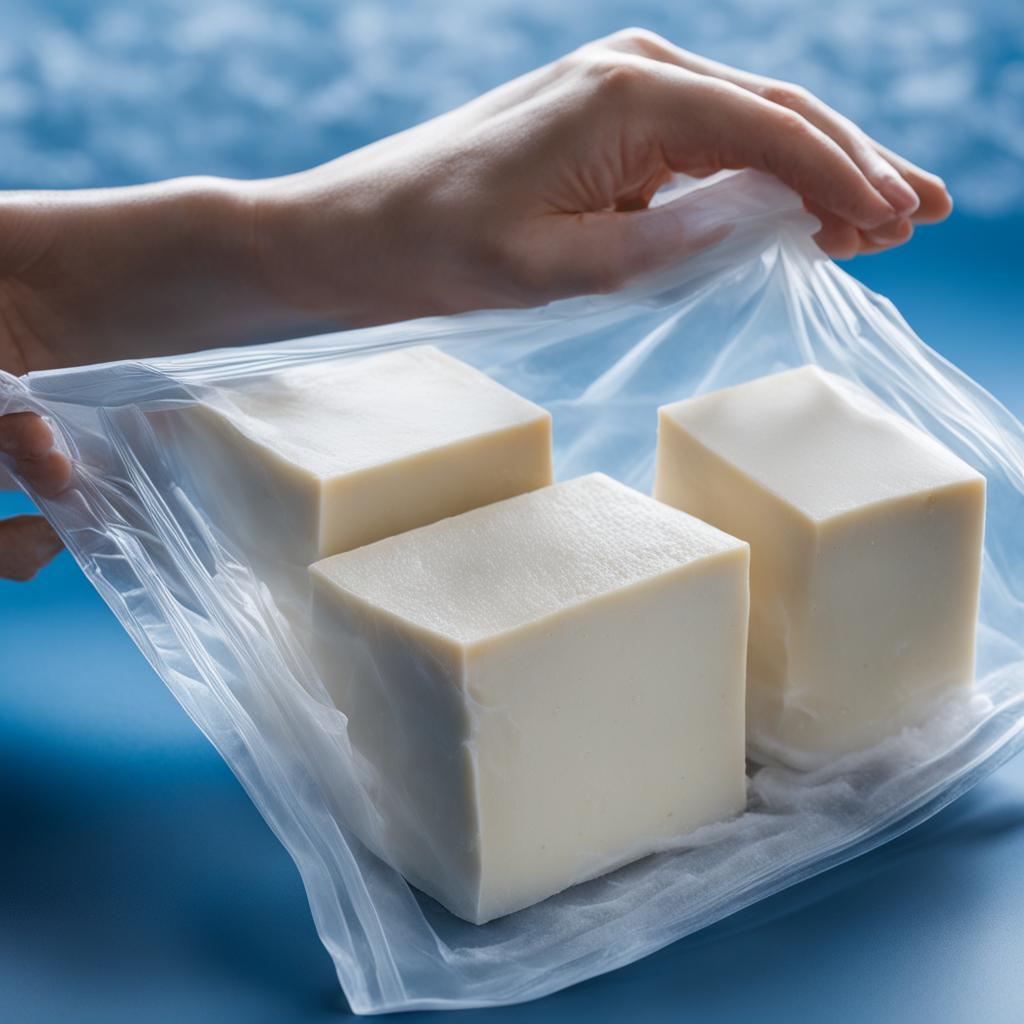When it comes to cooking with tofu, freshness is key. Properly storing tofu not only ensures its flavor but also maximizes its shelf life. As a tofu enthusiast, I’ve gathered some valuable tips on how to store tofu to keep it fresh and delicious. Whether you’re a seasoned pro or just starting your culinary adventures with tofu, these storage tips will help you make the most out of this versatile ingredient.
Before we dive into the specifics, let’s take a moment to understand what tofu is and why it’s worth storing properly. Tofu is a plant-based protein source made from coagulated soy milk. It’s known for its versatility, nutritional value, and culinary applications in various dishes.
Key Takeaways:
- Proper tofu storage ensures freshness and flavor.
- Tofu is a versatile plant-based protein source.
- It’s important to understand tofu’s nutritional value.
- Tofu offers various health benefits, including heart-healthy and cancer prevention properties.
- Choosing between fresh and packaged tofu affects convenience and authenticity.
Understanding Tofu
Tofu, also known as bean curd, is a popular culinary ingredient made from coagulated soy milk. It has been a staple in Asian cuisine for centuries and has gained popularity worldwide due to its versatility and nutritional value. Tofu comes in different textures, each with its own unique characteristics and culinary applications.
One of the most common types of tofu is silken tofu, which has a smooth and creamy texture. It is often used in desserts, dressings, and sauces. Soft tofu is slightly firmer and is commonly used in soups, stews, and stir-fries. Firm tofu has a solid texture and holds its shape well, making it suitable for grilling, baking, and frying. Extra firm tofu is dense and perfect for dishes that require a meat-like texture, such as tofu scrambles or vegan burgers.
What makes tofu truly remarkable is its ability to absorb flavors and adapt to various cooking methods. Its neutral taste allows it to take on the flavors of the ingredients it is cooked with, making it a versatile ingredient in both savory and sweet dishes. From tofu stir-fries and curries to tofu-based desserts like tofu cheesecake, the possibilities are endless when it comes to incorporating tofu into your culinary adventures.
The Different Textures of Tofu:
| Texture | Description | Culinary Applications |
|---|---|---|
| Silken | Smooth and creamy | Desserts, dressings, sauces |
| Soft | Slightly firmer | Soups, stews, stir-fries |
| Firm | Solid texture | Grilling, baking, frying |
| Extra Firm | Dense and meat-like | Tofu scrambles, vegan burgers |
Whether you follow a vegan or vegetarian diet, or simply want to incorporate more plant-based proteins into your meals, tofu is a versatile and nutritious option. It is a rich source of high-quality protein, essential amino acids, and minerals such as calcium, iron, and magnesium. Tofu is also a cholesterol-free food that can help support heart health and provide essential nutrients for overall well-being.
With its culinary flexibility and nutritional benefits, tofu is an ingredient that deserves a place in your kitchen. Experiment with different textures and cooking methods to discover new and exciting ways to enjoy this plant-based protein powerhouse.
Nutritional Value of Tofu
Tofu is not only a versatile ingredient but also packs a powerful punch when it comes to nutrition. It is low in calories and cholesterol-free, making it a healthy choice for those looking to maintain a balanced diet. But that’s not all— tofu is also an excellent source of plant-based protein, iron, calcium, and magnesium, making it an ideal choice for vegetarians and vegans.
When it comes to protein, tofu is a superstar. Just one cup of tofu contains about 20 grams of protein, which is equivalent to about four ounces of chicken or beef. This makes tofu a fantastic option for those looking to increase their protein intake without relying on animal products. Additionally, tofu also provides all nine essential amino acids, making it a complete protein source.
But it’s not just protein that tofu has to offer. It is also a good source of iron, with one cup providing around 15% of the recommended daily intake. Iron is essential for the production of red blood cells, which carry oxygen throughout the body. Furthermore, tofu is rich in calcium, providing about 20% of the recommended daily intake per cup. Calcium is crucial for strong bones and teeth, as well as maintaining proper nerve function.
Lastly, tofu contains magnesium, an essential mineral involved in various bodily functions. Magnesium helps regulate blood pressure, maintain heart health, and support bone health. Incorporating tofu into your diet can help ensure you meet your daily magnesium needs.
Summary:
- Tofu is low in calories and cholesterol-free, making it a healthy choice.
- It is an excellent source of plant-based protein, iron, calcium, and magnesium.
- One cup of tofu contains about 20 grams of protein, making it a great alternative to animal products.
- Tofu provides all nine essential amino acids, making it a complete protein source.
- It is a good source of iron, calcium, and magnesium, which are vital for various bodily functions.
Table: Nutritional Content of Tofu (per 100 grams)
| Nutrient | Amount |
|---|---|
| Protein | 8 grams |
| Fat | 4 grams |
| Carbohydrates | 2 grams |
| Iron | 2.5 milligrams |
| Calcium | 350 milligrams |
| Magnesium | 40 milligrams |
Health Benefits of Tofu
Tofu, a versatile plant-based protein, offers numerous health benefits that make it a valuable addition to any diet. From promoting heart health to aiding in cancer prevention, tofu’s nutritional profile makes it a superstar in maintaining overall well-being.
One of the key health benefits of tofu is its heart-healthy properties. Tofu is low in saturated fat and cholesterol, making it a beneficial choice for maintaining cardiovascular health. Its high levels of unsaturated fats, such as omega-3 fatty acids, can help lower bad cholesterol levels and reduce the risk of heart disease.
In addition to its heart-healthy attributes, tofu also exhibits potential cancer prevention properties. Soy-based foods, including tofu, contain phytochemicals called isoflavones, which have been shown to inhibit the growth of cancer cells and reduce the risk of certain types of cancer, such as breast and prostate cancer.
Tofu’s health benefits extend beyond heart health and cancer prevention. Its high protein content, combined with essential amino acids, makes it an excellent choice for supporting muscle development and weight management. Tofu is also rich in antioxidants, which help protect the body against inflammation and oxidative stress, promoting overall health and longevity.
With its multitude of health benefits, tofu proves to be a valuable addition to any diet. Incorporating tofu into your meals can provide a nutrient-rich boost while supporting heart health, aiding cancer prevention, and contributing to overall well-being.
Selecting Tofu
When it comes to selecting tofu, there are a few options to consider: fresh tofu and packaged tofu. Fresh tofu is typically found in specialty stores and offers an authentic experience, while packaged tofu is more convenient and readily available in supermarkets. Both options have their advantages and it ultimately comes down to personal preference and the specific needs of your recipe.
For those who value freshness and want to have a hands-on experience, fresh tofu is the way to go. It is often made locally and has a shorter shelf life compared to packaged tofu. However, fresh tofu has a delicate texture and a subtle taste, making it ideal for dishes where the tofu takes center stage.
On the other hand, packaged tofu offers convenience and a longer shelf life. It is usually vacuum-sealed or packed in water, which helps to preserve its freshness. Packaged tofu comes in various textures such as firm and extra firm, providing versatility in different cooking methods. Whether you’re stir-frying, grilling, or using tofu in soups or stews, packaged tofu can be a reliable and convenient option.
When selecting tofu, it’s important to check the expiration date to ensure its freshness. Additionally, consider factors such as whether the tofu is organic or non-GMO, as these options may align with personal preferences or dietary requirements. By carefully selecting the type of tofu that suits your needs, you can enhance the flavors and textures in your favorite tofu dishes.
Table: Tofu Selection Guide
| Tofu Type | Texture | Advantages | Recommended Uses |
|---|---|---|---|
| Fresh Tofu | Soft and delicate | Authentic taste and texture | Silken tofu: desserts, sauces |
| Packaged Tofu | Firm | Sturdy texture, holds its shape | Stir-frying, grilling |
| Extra Firm | Dense and chewy texture | Baking, pan-frying | |
| Super Firm | Very dense, almost meat-like texture | Grilling, braising |
Unopened Tofu Storage
Properly storing unopened tofu is essential for maintaining its freshness and maximizing its shelf life. Whether you store it in the refrigerator or the freezer, taking the right steps will ensure that your tofu stays in optimal condition.
Refrigerating Unopened Tofu
The most common method for storing unopened tofu is refrigeration. To refrigerate unopened tofu, simply leave it in its original packaging and place it in the refrigerator. It is best to keep it in the coldest part of your refrigerator, such as the bottom shelf. This will help maintain its freshness and prevent it from spoiling.
It’s important to note the shelf life of unopened tofu. Typically, unopened tofu can last for up to one week in the refrigerator. However, always check the expiration date on the packaging for specific guidelines.
Freezing Unopened Tofu
If you want to extend the shelf life of unopened tofu even further, you can freeze it. Freezing unopened tofu can provide longer storage options, allowing you to have tofu on hand whenever you need it.
To freeze unopened tofu, simply remove it from the original packaging, drain any excess liquid, and place it in an airtight freezer bag or container. Make sure to label the container with the date to keep track of its freshness. When you’re ready to use the tofu, thaw it in the refrigerator overnight before cooking.
Keep in mind that freezing tofu can change its texture slightly. Once thawed, the tofu may have a slightly firmer and chewier texture compared to fresh tofu. However, this change in texture does not affect the taste or quality of the tofu.
Opened Tofu Storage
Once you’ve opened a package of tofu, proper storage is crucial to maintain its freshness and texture. Here are some tips to help you keep your opened tofu in optimal condition:
Refrigerating
After opening the tofu, transfer the remaining portion to an airtight container. Cover the tofu with fresh water to keep it moist and prevent it from drying out. Store the container in the refrigerator, where it will stay fresh for up to five days.
Freezing
If you won’t be using the opened tofu within five days, you can freeze it to extend its shelf life. Drain any excess water from the tofu and wrap it tightly in plastic wrap or place it in an airtight freezer bag. Frozen tofu can be stored for up to three months.
When you’re ready to use the frozen tofu, thaw it slowly in the refrigerator. This will allow it to regain its original texture and quality. Avoid thawing tofu at room temperature, as this can lead to the growth of harmful bacteria.
| Storage Method | Shelf Life |
|---|---|
| Refrigerating | Up to 5 days |
| Freezing | Up to 3 months |
Remember, once tofu has been frozen and thawed, its texture will change. It will become more porous, allowing it to absorb flavors more easily when cooked. This can be an advantage if you’re looking to infuse your tofu with additional flavors.
Properly Sealing Opened Tofu
When it comes to storing opened tofu, proper sealing is the key to maintaining its freshness and preventing odor absorption. By taking a few simple steps, you can ensure that your tofu stays delicious and ready to use in your favorite recipes.
Method 1: Airtight Container and Fresh Water
One effective method of sealing opened tofu is to transfer it to an airtight container and cover it with fresh water. This helps prevent the tofu from drying out and maintains its moisture content. Simply place the opened tofu in a container, pour enough fresh water to cover it completely, and seal the container tightly. This method not only prevents the tofu from absorbing unwanted smells but also helps retain its firm texture.
Method 2: Tightly Wrapped in Plastic Wrap
If you prefer a more compact storage solution, you can tightly wrap the opened tofu in plastic wrap. Start by draining any excess liquid from the tofu package, then wrap the tofu tightly in a few layers of plastic wrap, ensuring there are no gaps or exposed areas. This method creates a barrier that prevents air and odors from reaching the tofu, helping it stay fresh for longer.
Caution: Avoid Cross-Contamination
It’s important to note that when sealing opened tofu, you should avoid cross-contamination with other foods. Always use a separate container or wrap for the tofu to prevent any transfer of flavors or bacteria. Additionally, remember to label the container or wrap with the date to keep track of its freshness.
By properly sealing opened tofu with either the airtight container and fresh water method or the tightly wrapped in plastic wrap method, you can maintain its freshness, prevent odor absorption, and ensure it’s ready to be used in your culinary creations.

Shelf Life of Unopened Tofu
When it comes to unopened tofu, it’s important to be aware of its shelf life to ensure its freshness and quality. While tofu is known for its relatively short shelf life, proper storage can help extend its usability beyond the expiration date. Refrigerating unopened tofu in its original packaging is the key to maintaining its freshness.
On average, unopened tofu can last up to two weeks past the expiration date when stored properly in the refrigerator. However, it’s important to note that the texture and flavor of tofu may deteriorate over time. Therefore, it’s crucial to check for signs of spoilage, such as unusual discoloration or an off-putting odor, before consuming.
To make the most of your unopened tofu, it’s recommended to use it within the recommended timeframe and prioritize freshness. By understanding the shelf life of unopened tofu and following proper storage practices, you can enjoy this versatile ingredient in your favorite dishes without compromising its quality.
Table: Tofu Shelf Life
| Storage Method | Shelf Life |
|---|---|
| Refrigerated (unopened) | Up to two weeks past the expiration date |
Checking Tofu Expiration Dates
When it comes to ensuring the freshness and quality of your tofu, checking the expiration date is crucial. Whether you’re buying fresh tofu or packaged tofu, taking a moment to inspect the expiration date can make all the difference in taste and texture. Expired tofu can have a negative impact on your culinary creations, so it’s essential to pay attention to this important detail.
To find the expiration date, take a look at the packaging of the tofu. It’s usually printed on the label or the bottom of the container. Make sure to check for any signs of tampering or damage to the packaging as well. If you’re unsure about the expiration date or the condition of the tofu, it’s best to err on the side of caution and choose a different package.
Using tofu that is close to or past its expiration date can result in a loss of freshness and potentially lead to spoilage. To avoid any unpleasant surprises, always prioritize using tofu that is within its recommended shelf life. By checking the expiration date, you can ensure that you’re using tofu at its peak freshness, enhancing the flavor and quality of your dishes.
Table: Signs of Spoiled Tofu
| Signs of Spoilage | What to Look For |
|---|---|
| Sour smell | If the tofu emits an unpleasant, sour odor, it is likely spoiled and should be discarded. |
| Unusual discoloration | Any green, blue, or mold-like discoloration on the tofu indicates spoilage and it should not be consumed. |
| Slimy texture | If the tofu feels slimy or sticky to the touch, it has gone bad and should be thrown away. |
Freezing Unopened Tofu
Freezing unopened tofu is a great way to extend its shelf life and have it on hand for future use. By draining the liquid from the package and wrapping the tofu tightly in plastic wrap or placing it in an airtight freezer bag, you can freeze tofu without compromising its quality. Freezing unopened tofu can significantly increase its storage time, allowing you to stock up on this versatile ingredient.
When freezing unopened tofu, it’s important to note that the texture may change slightly after thawing. The frozen tofu will become more porous and chewier, which can be beneficial for certain recipes. For example, frozen tofu can be crumbled and used as a substitute for ground meat in vegetarian dishes.
When you’re ready to use the frozen tofu, simply thaw it in the refrigerator overnight. Thawing tofu slowly in the refrigerator allows it to regain its original texture and consistency. Avoid thawing tofu at room temperature or using a microwave, as rapid thawing can result in a mushy texture.
| Benefits of Freezing Unopened Tofu |
|---|
| Extends shelf life |
| Convenient for meal planning |
| Allows for different textures |
| Reduces food waste |
By freezing unopened tofu, you can ensure that you always have a supply of fresh tofu available, even if you’re unable to make a trip to the grocery store. It’s a convenient and economical way to maximize the use of this nutritious ingredient. Experiment with different textures and explore new culinary possibilities with frozen tofu.

Freezing Opened Tofu
When it comes to storing opened tofu, freezing can be a game-changer. Freezing opened tofu not only prevents spoilage but also transforms its texture, offering new culinary possibilities. Here’s how you can freeze opened tofu to maximize its shelf life and create exciting dishes.
To start, drain excess water from the opened tofu. You can do this by gently pressing the tofu between paper towels or using a tofu press. Removing excess moisture helps the tofu maintain its texture during freezing and thawing.
Next, wrap the tofu tightly in plastic wrap or place it in an airtight container. Properly sealing the opened tofu prevents freezer burn and helps retain its freshness. Remember to label the package with the date to keep track of its storage time.
When you’re ready to use the frozen tofu, make sure to thaw it properly. The recommended method is to thaw the tofu in the refrigerator overnight. This gradual thawing process allows the tofu to regain its texture and absorb flavors when cooked. Once thawed, squeeze out any excess moisture before incorporating the tofu into your favorite recipes.
Freezing Opened Tofu: Tips and Tricks
To further enhance your experience with freezing opened tofu, here are some additional tips and tricks:
- If you plan to use only a portion of the opened tofu, consider cutting it into smaller pieces before freezing. This way, you can easily thaw and use the desired amount without having to defrost the entire package.
- Experiment with different textures by freezing tofu at different stages. Freezing tofu when it’s softer will result in a spongier texture, perfect for absorbing marinades. Freezing tofu when it’s firmer will yield a denser texture, ideal for stir-fries and grilling.
- Marinate the tofu before freezing to infuse it with even more flavor. The freezing process allows the tofu to absorb the marinade, resulting in a delicious taste throughout.
By freezing opened tofu, you can extend its shelf life while unlocking new culinary possibilities. Whether you’re a tofu enthusiast or looking to explore plant-based protein options, freezing opened tofu is worth a try. Get creative in the kitchen and discover the texture transformation that awaits!
Signs of Spoiled Tofu
As with any food, tofu can spoil over time, affecting its taste, texture, and overall safety for consumption. It’s important to be able to recognize the signs of spoiled tofu to avoid any potential health risks. Here are some common indicators that your tofu may have gone bad:
- Unusual odor: Spoiled tofu often emits a sour or pungent smell that is noticeably different from its fresh counterpart.
- Change in texture: Tofu that has spoiled may become slimy or develop a mushy consistency. It should ideally be firm and retain its shape.
- Discoloration: If you notice any unusual discoloration, such as yellow or gray spots on the tofu, it may be a sign of spoilage.
When encountering any of these signs, it is best to discard the tofu rather than risk consuming it. Spoiled tofu can potentially cause foodborne illnesses, so it’s always better to err on the side of caution when it comes to food safety.
The Importance of Proper Tofu Storage
Proper storage is key to extending the shelf life of tofu and ensuring its freshness. By following the recommended storage guidelines, you can minimize the risk of spoilage and enjoy tofu at its best.
Remember to always check the expiration date when purchasing tofu and choose the freshest option available. Properly sealing opened tofu, refrigerating unopened tofu, and freezing tofu when necessary can significantly prolong its usability. By being mindful of these storage practices, you can maintain the quality of your tofu and fully enjoy its culinary versatility.
Conclusion
In conclusion, properly storing tofu is essential for maintaining its freshness and flavor. By following these tofu storage tips, you can ensure that your tofu stays fresh for longer, maximizing its shelf life and enhancing your culinary adventures.
First and foremost, always check the expiration dates on tofu packaging to guarantee its freshness. Avoid purchasing tofu that is close to expiring.
To maintain the quality of opened tofu, it’s crucial to properly seal it. Transfer opened tofu to an airtight container, cover it with fresh water, or tightly wrap it in plastic wrap. This will prevent spoilage and maintain its taste and texture.
Lastly, be aware of the signs of spoiled tofu. If you notice a sour smell, unusual discoloration, or a slimy texture, it’s best to discard the tofu to avoid any potential foodborne illness.
By following these freshness hacks and storage tips, you can enjoy the versatility and nutritional benefits of tofu in your cooking. So go ahead and embark on your culinary adventures with confidence!
FAQ
How do I store tofu to keep it fresh?
To maintain freshness, refrigerate unopened tofu in its original packaging or freeze it. After opening, store tofu in an airtight container with fresh water in the refrigerator or freeze it.
How long does unopened tofu last?
Unopened tofu can last up to two weeks past the expiration date if properly refrigerated. However, the texture and flavor may deteriorate over time.
How can I tell if tofu has gone bad?
Spoiled tofu may have a sour smell, unusual discoloration, or a slimy texture. If you notice any of these signs, it’s best to discard the tofu.
Can I freeze opened tofu?
Yes, you can freeze opened tofu. Before freezing, drain excess water and wrap the tofu tightly in plastic wrap or place it in an airtight container. Thaw it in the refrigerator before use.
What are the health benefits of tofu?
Tofu has numerous health benefits. It’s a low-calorie, cholesterol-free source of protein, iron, calcium, and magnesium. It can help reduce the risk of heart disease, certain types of cancer, and support weight management and muscle development.
How do I choose between fresh tofu and packaged tofu?
Fresh tofu offers an authentic experience but can be found in specialty stores, while packaged tofu is convenient and available in supermarkets. Consider factors such as the expiration date and organic or non-GMO options when choosing tofu.
How should I properly seal opened tofu?
To maintain freshness and prevent odor absorption, transfer opened tofu to an airtight container with fresh water or wrap it tightly in plastic wrap. Proper sealing is crucial to avoid spoilage.
Can I freeze unopened tofu?
Yes, freezing unopened tofu can extend its shelf life. Drain the liquid from the package and wrap the tofu tightly in plastic wrap or place it in an airtight freezer bag. Thaw it in the refrigerator before use.
How do I check the expiration date on tofu packaging?
It’s important to inspect the packaging for the expiration date to ensure freshness. Avoid purchasing tofu that is close to expiring, as it may affect the taste and texture.
What are the different types of tofu?
Tofu comes in various textures, including silken, soft, firm, and extra firm. Each texture has its own culinary applications and can be used in a wide range of dishes.
What is the nutritional value of tofu?
Tofu is a nutritious plant-based protein source. It is low in calories, cholesterol-free, and a good source of protein, iron, calcium, and magnesium. It is an ideal choice for those following a vegetarian or vegan diet.
Source Links
- https://www.connoisseurusveg.com/tofu-storage-guide/
- https://www.wikihow.com/Store-Tofu
- https://www.savorysuitcase.com/how-to-store-tofu/
Related Recipes:
 Does Peanut Butter Go Bad? Shelf Life and Storage Tips
Does Peanut Butter Go Bad? Shelf Life and Storage Tips
 Does Almond Milk Go Bad? How to Tell and Storage Tips.
Does Almond Milk Go Bad? How to Tell and Storage Tips.
 Can You Eat Expired Butter? What You Need to Know
Can You Eat Expired Butter? What You Need to Know
 Cream Cheese Shelf Life: How Long Does It Last?
Cream Cheese Shelf Life: How Long Does It Last?
 Does Chocolate Syrup Go Bad? What You Need to Know.
Does Chocolate Syrup Go Bad? What You Need to Know.
 Feta Cheese Storage: How Long Does It Last?
Feta Cheese Storage: How Long Does It Last?
 How to Store Ham to Maintain Its Flavor
How to Store Ham to Maintain Its Flavor
 Beef Stew Shelf Life: How Long Does It Last in the Fridge?
Beef Stew Shelf Life: How Long Does It Last in the Fridge?







